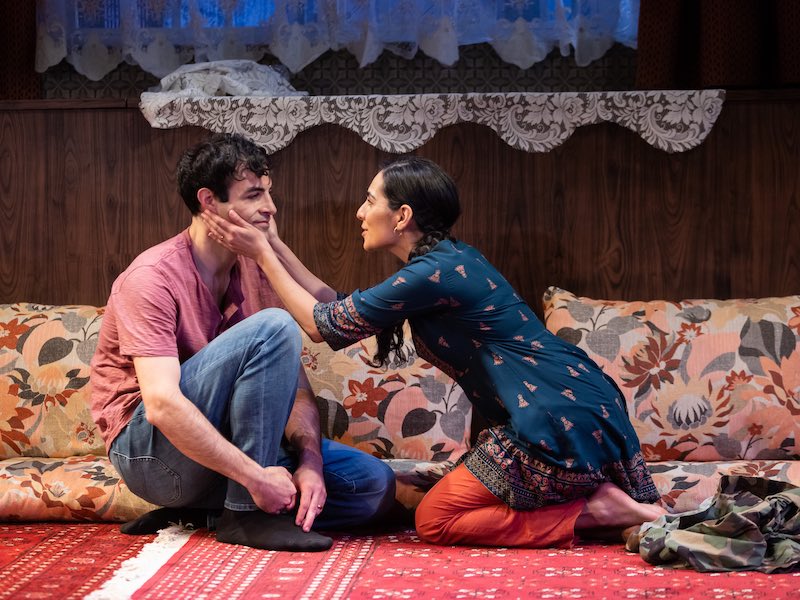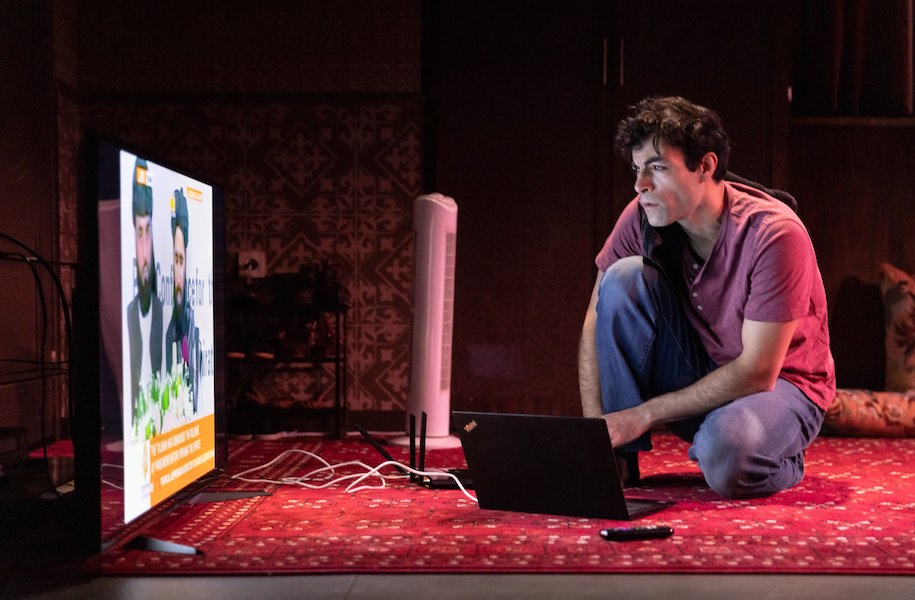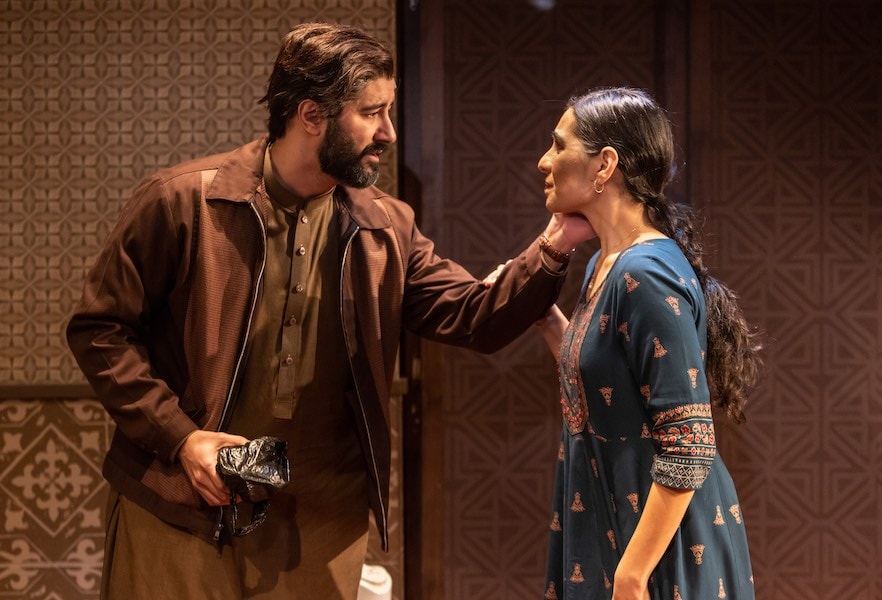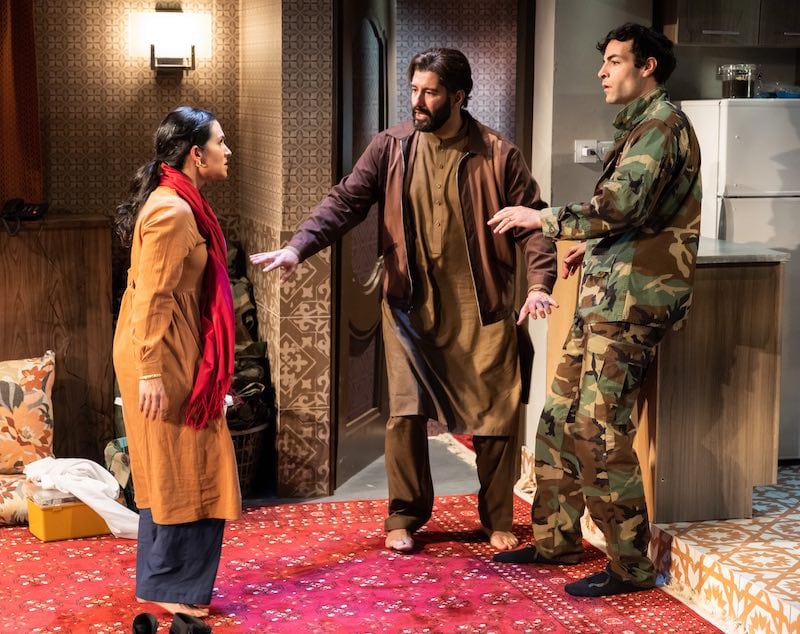This is a story of war — not on the battlefield but the cost in human terms that continues long after the soldiers have come home. Selling Kabul is not the usual fare produced at Signature Theatre — known best for new takes on Sondheim and other Broadway-style musicals — but the theater has given the DMV its area premiere of an important play. Hard-hitting, provocative, and heart-wrenching.
Actually, the play doesn’t feel like theater. It’s all too real.
Hyper social-realism once dominated the English-speaking stage — what was called kitchen sink drama. Coming out of post-war Britain and penned by a group of mostly male writers, they were grouped together as “angry young men,” and their plays were often set in cramped one-room flats and featured the roiling underclass. The style has pretty much gone out of fashion. (The general thinking today is television can do it so much better.)

But along comes writer Sylvia Khoury, who is also angry and wants to hurl her anger at the U.S., which bears great blame for abandoning Afghanistan and its responsibility to the people, not only those who worked for U.S. interests, but the general population now left in poverty and chaos under a cruel despotic system. Khoury is on a mission lest we forget: the vulnerable people of Afghanistan are still there, and we need to recognize and remember them. To do justice to their perspective, she uses her pen like a camera coming in for a close-up to examine four lives trying to survive their harsh circumstances. The writer clearly has made waves with this work, as it was short-listed for as a Pulitzer Prize finalist.
The story is compressed to approximately 105 minutes and conveyed in real-time. Multi-award–winning scenic designer Tony Cisek has faithfully captured all the details of a tiny apartment in downtown Kabul, from the tiny area to discard shoes by the door, floor pillows lined up as the only furniture, and two small Afghan rugs to the tiny corner kitchen — the center of Afghan hospitality and family life — complete with sink that functions with running water. The only curious stand-out is a wide-screen TV, a prop that becomes a symbol and an important plot point later on.

Four characters share this spare, claustrophobic space and all are trying to scratch out some precarious existence. A tailor husband (Jawid) and seamstress wife (Afiya) make uniforms for the Taliban while she struggles with sleeplessness and lost pregnancies due to stress. Her brother (Taroon) has bunked with them for four months, in hiding, because he had served as a translator for the American side and anxiously awaits his promised visa from his American soldier-partner Jeff, whom he served and fought beside. Afiya’s old friend and chatty next-door neighbor, Leyla, beaming cheerfulness, continuously pops in to gossip and seems innocuous enough at first.
The year is 2013 following that year’s U.S. military drawdown and the ramping up of Taliban forces flooding the capital and other parts of the country, which places everyone in danger, especially Taroon, and anyone suspected of harboring him.
The actors in the show must convey not only their outward circumstances and threats but the inner conflicts they must wrestle with to survive. Awesta Zarif drops golden moments of truth as the ever-vigilant central figure of Afiya. She personifies the classic role of Afghan Woman, held up as enduring and resilient, but she makes us feel her every moment as another shock wave, showing us that endurance and outward resiliency come at a cost.

Neagheen Homaifar as Leyla must by turns show herself to be the upbeat, loyal friend while pursuing a dangerous mission to protect her family. It’s as if Homaifar walked in off the street, a blithering socially clueless chatterbox taking up her friend’s (and the audience’s) time — until she reveals being both the toughest and most desperate.
Mazin Akar plays Taroon. In a way he sticks out, seeming the most extroverted and theatrical in his gestures and style of acting. Perhaps it is a choice by him and director Shadi Ghaheri to show us the man has already transitioned to another culture. He can’t go back and not just because of imminent danger. Meanwhile, his character is torn up wanting desperately to see his wife and newborn baby boy. Akar unleashes a powerful performance.
Yousof Sultani gives a most understated and beautifully nuanced performance as Jawid, who endures outward brutality and humiliation as well as projections of the other three as a Taliban lover, all to protect his family. His revelation gives potent meaning to the title of the play. His emotive expressions were heartbreaking.

Ghaheri knows well how tricky it is to pull off hyper-realism on stage today. One step one way and it all comes off flat, and occasionally in the first half, several beats seem to start and end at the same level vocally and emotionally. An unprepared step in another and we get melodrama. She has navigated well.
In Signature’s intimate ARK space, the design team has worked in concert to transport us to a few square feet in a neighborhood in Kabul. I want to mention in particular Matt Otto’s sound design, which deftly bumps up the voices but manages to preserve the intended intimacy. We are confined in the room with these Afghan characters, and it gets so claustrophobic that it feels we too have been left behind, living in isolation, constant fear, and panic that suddenly senses the Taliban are going to bust in the door.
As the urgency ratchets up and surprises are revealed, the story becomes a heart-stopping and emotionally wrenching journey as true as true. The play asks us, what other voices from Afghanistan are out there? And is there more we should do?
Running Time: One hour 45 minutes performed without an intermission.
Selling Kabul plays through April 2, 2023, in the ARK Theatre at Signature Theatre, 4200 Campbell Ave, Arlington VA. For tickets ($62–$98), call (703) 820-9771 or purchase online. Information about ticket discounts is available here.
The program for Selling Kabul is online here.
Closed captions are available via the GalaPro app.
COVID Safety: Masks are always optional but strongly encouraged in the lobby and other public areas of the building. Face masks are required inside the performance spaces on Thursdays and Sundays. Face masks are optional but strongly encouraged inside the performance spaces on Tuesdays, Wednesdays, Fridays, and Saturdays. Signature’s COVID Safety Measures can be found here.
Selling Kabul
Written by Sylvia Khoury
Directed by Shadi Ghaheri
CAST
Mazin Akar (Taroon), Neagheen Homaifar (Leyla), Yousof Sultani (Jawid), and Awesta Zarif (Afiya)
CREATIVE TEAM
Scenic Design by Tony Cisek, Costume Design by Moyenda Kulemeka, Lighting Design by John D. Alexander, and Sound Design by Matt Otto. Humaira Ghilzai is the Cultural Consultant & Dramaturg. Casting is by Jorge Acevedo & JZ Casting, Geoff Josselson, CSA & Katja Zarolinski, CSA. Lauren Pekel is the Production Stage Manager and Erica Feidelseit is the Production Assistant.




